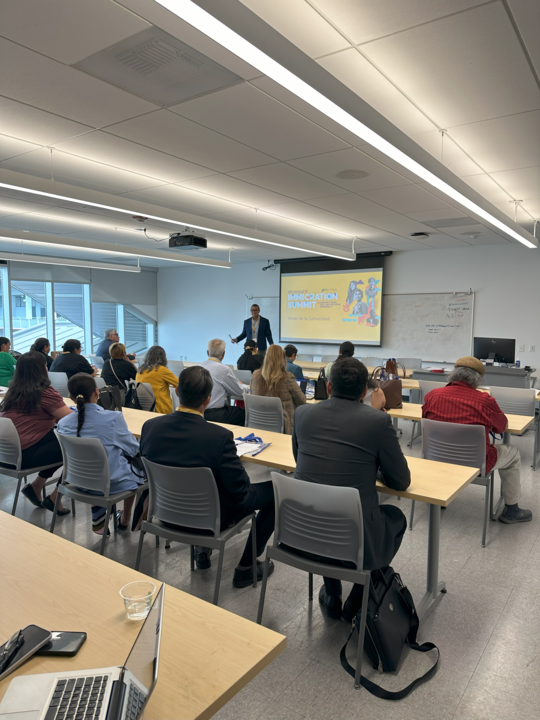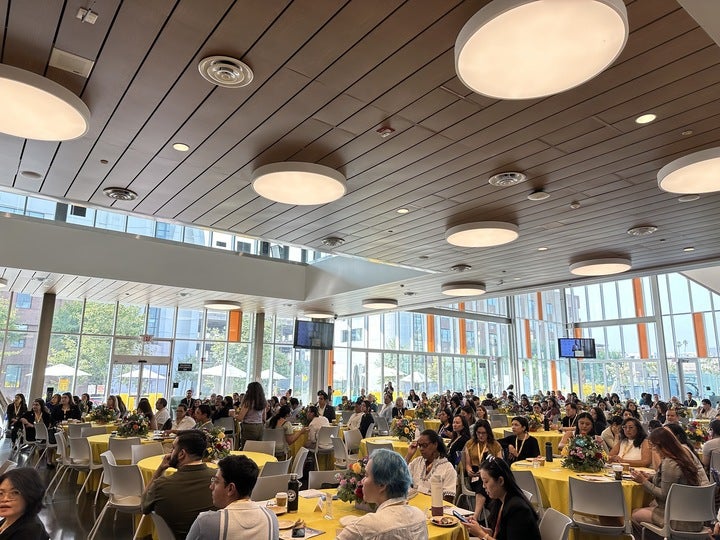
2024 Los Angeles Immigration Summit Recap
On Thursday, July 11 and Friday, July 12, 2024, USC Equity Research Institute (ERI) and the California Community Foundation (CCF), as well as almost five hundred cross-sector partners, leaders, academia, and activists, gathered for the 5th Annual Immigration Summit. Taking place at the Los Angeles Trade-Technical College, the Summit showcased the outstanding efforts made throughout the county and state and featured ERI’s State of Immigrants in Los Angeles County (SOILA) 2024 report to elevate the fact that immigrant inclusion is everybody’s business—from the local to global level.
Although significant efforts have been made and are in progress, the Summit serves as a restatement of our commitment and duty to the immigrants who have chosen or have been forced to call this region home. Furthermore, it creates a roadmap in collaboration with cross-sector allies for a just and inclusive future for all, while holding elected officials, funders, the private sector, and other decision-makers accountable. This year’s Summit has also reiterated the importance of creating and opening pathways needed for immigrants to live and thrive civically, economically, socially, and in safety across four themes: (1) Resist, (2) Rebuild, (3) Renew, and (4) Recommit.

Resist
Our organizations must be bolder, more creative, and braver than ever in pushing forward the pro-immigrant agenda, while facing burnout and fending off attacks that attempt to diminish our progress and collective struggle. Given the need to make the movement stronger and think more creatively, we must ensure we are always guided by hope for a better world—one created through difficult inner restructuring and radical action. This will make central—as panelists in the Opening Plenary reiterated—story ownership, solidarity in coalition building beyond times of crises, and narrative power-building.
Across the two days of the Summit, sessions focused on uplifting the voices of immigrant communities who are closest to the issue and thus, closest to the solution. This involves strategic direction of investments educating immigrant workers, as well as toward the wellbeing, health, and care of staff, especially organizers, within the movement who are burnt out and lack safety nets. The idea that investing in the sustainability of staff is an investment in the sustainability of the movement was the central message echoed by panelists in Day 1 Breakout Session E. These moments of care and thoughtful considerations within our organizations and across our movements must be met with utmost creativity to strengthen our relationships and align for momentum and actionable progress.
As we look at our past, we must build on the work organizers and advocates who shifted policies and narratives that have made California the progressive state we know today. We must not only protect the historical and present-day wins we have collectively achieved, but also build on them by institutionalizing them for sustainability and directly engaging with the immigrant community itself—as Angelica Salas, Chancee Martorell, and Rigo Reyes shard in Breakout Session A: Protecting What We’ve Built. This looks like collectively strategizing and resource-sharing to strengthen mobilization and civic engagement capacity efforts, implement community participatory budgeting, create training pipeline programs to engage folks in advocacy, ensure preparedness, and uplift specific needs and issues shared by communities.
Rebuild
Across the two days of the Summit, we observed our partners in this diverse and ever growing movement in the main room and breakout sessions as we listened to various issues affecting our immigrant communities. We also noticed who is and isn’t included, and what is and isn’t prioritized in our movement. We must address this to reflect our commitment and accountability to our communities, understanding that now is the opportunity to rethink our work and infrastructure. This need was highlighted in Day 2, Session D when Odilia Romero exposed the lack of inclusion of Indigenous migrants, as well as the refusal of the overall movement in recognizing language justice as a fundamental human right. We must strengthen our movement’s interrelations and political power, interrogate our current practices of inclusion, and make sure our actions align on shared values.
In this light, there is an opportunity to reevaluate our plans to be strategic and empower each other. The power of strategy, particularly, in narrative messaging is central to rebuilding our movement. Many still fall in the gaps of disinformation and distrust, shifting to the center rather than beside us in the movement. Our work must make significant impact in reaching them and others beyond our established base. We must organize to address and overcome challenges related to budget and timeline transparency, dedicated funding streams, and the implementation of community participatory budgeting. These efforts will only empower our communities and ensure their vision is not just glanced by decision makers but actually integrated into policy and action. Moreover, philanthropy must be thoroughly committed and intentional in their practices. Philanthropists must fund the movement as if they want the movement to win.
Renew
As we resist and rebuild, we must also renew our connections, narratives, and power. This renewal requires us to continuously build coalitions based on trust and solidarity. Throughout the two days, many sessions and discussions highlighted the importance of renewing across the movement. For example in Day 2 session D: Indigenous Migrants in LA County, we learned that building trust with the community to better serve their needs means addressing the ongoing lack of inclusion of Indigenous migrants and affirming language justice as a fundamental human right. It also means, as Guillermo Torres emphasized in Day 1 session A, faith and religious leaders play a crucial role in welcoming immigrants by empowering, not overpowering, the voices of those who are directly impacted.
By renewing our commitment to these principles, we not only strengthen the movement but also ensure that it remains adaptable and resilient in the face of new challenges. Renewal is about deepening our connections and expanding our capacity to create lasting, transformative change for all immigrant communities.
Recommit
Reflecting on the work ahead, it’s clear that our ongoing success depends on our continued commitment—to our mission, our communities, and each other. Recommitting helps ensure that the progress we’ve made is sustained and that we remain focused on the path ahead. But what does that look like in practice? It means addressing the critical need for equity in funding, particularly in underfunded regions of California, as discussed in Day 2 plenary 1. We must ensure that immigrants are not abandoned by budget cuts. Instead, we should shift from a survivalist policy stance to one that builds thriving communities regardless of immigration status.
Recommitting also involves understanding the deeper impact of our work, which goes beyond policy changes to shifting power. Just as California became a progressive state through the hard-fought victories of organizers and advocates who shifted policy and narrative, our ongoing efforts must continue to focus on building political power. A more inclusive democracy is possible when foundations and community organizations include strategies that build and sustain this power.

The discussions and insights shared during these two days at the 5th Annual Immigration Summit have reaffirmed our commitment to immigrant communities across Los Angeles and beyond. As we reflect on the themes of Resist, Rebuild, Renew, and Recommit, it becomes clear that our path forward is about actively shaping a more inclusive and just future for all. By continuing to resist oppressive forces, rebuild our movement with intentionality, renew our connections and narratives, and recommit to the principles of equity and power-sharing, we can ensure that our work not only endures but thrives. Together, we will continue to push for transformative change, knowing that the road ahead, though challenging, is one we are prepared to navigate with solidarity and purpose.